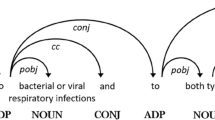Abstract
Identification of Cause-effect (CE) relation mentions, along with the arguments, are crucial for creating a scientific knowledge-base. Linguistically complex constructs are used to express CE relations in text, mainly using generic causative (causal) verbs (cause, lead, result etc). We observe that some generic verbs have a domain-specific causative sense (inhibit, express) and some domains have altogether new causative verbs (down-regulate). Not every mention of a generic causative verb (e.g., lead) indicates a CE relation mention. We propose a linguistically-oriented unsupervised iterative co-discovery approach to identify domain-specific causative verbs, starting from a small set of seed causative verbs and an unlabeled corpus. We use known causative verbs to extract CE arguments, and use known CE arguments to discover causative verbs (hence co-discovery). Since causes and effects are typically agents, events, actions, or conditions, we use WordNet hypernym categories to identify suitable CE arguments. PMI is used to measure linguistic associations between a causative verb and its argument. Once we have a list of domain-specific causative verbs, we use it to extract CE relation mentions from a given corpus in an unsupervised manner, filtering out non-causative use of a causative verb using WordNet hypernym check of its arguments. Our approach extracts 256 domain-specific causative verbs from 10, 000 PubMed abstracts of Leukemia papers, and outperforms several baselines for extracting intra-sentence CE relation mentions.
Access this chapter
Tax calculation will be finalised at checkout
Purchases are for personal use only
Similar content being viewed by others
References
Joskowicz, L., Ksiezyck, T., Grishman, R.: Deep domain models for discourse analysis. In: Proceedings of the Annual AI Systems in Government Conference, 1989, pp. 195–200. IEEE (1989)
Khoo, C.S., Kornfilt, J., Oddy, R.N., Myaeng, S.H.: Automatic extraction of cause-effect information from newspaper text without knowledge-based inferencing. Lit. Linguist. Comput. 13(4), 177–186 (1998)
Girju, R.: Automatic detection of causal relations for question answering. In: Proceedings of the ACL 2003 workshop on Multilingual Summarization and Question Answering, vol. 12, pp. 76–83. Association for Computational Linguistics (2003)
Radinsky, K., Davidovich, S., Markovitch, S.: Learning causality from textual data. In: Proceedings of Learning by Reading for Intelligent Question Answering Conference (2011)
Kim, H.D., Zhai, C., Rietz, T.A., Diermeier, D., Hsu, M., Castellanos, M., Ceja Limon, C.A.: Incatomi: integrative causal topic miner between textual and non-textual time series data. In: Proceedings of the 21st ACM International Conference on Information and Knowledge Management, pp. 2689–2691. ACM (2012)
Chang, D.-S., Choi, K.-S.: Causal relation extraction using cue phrase and lexical pair probabilities. In: Su, K.-Y., Tsujii, J., Lee, J.-H., Kwong, O.Y. (eds.) IJCNLP 2004. LNCS (LNAI), vol. 3248, pp. 61–70. Springer, Heidelberg (2005). https://doi.org/10.1007/978-3-540-30211-7_7
Do, Q.X., Chan, Y.S., Roth, D.: Minimally supervised event causality identification. In: Proceedings of the Conference on Empirical Methods in Natural Language Processing, pp. 294–303. Association for Computational Linguistics (2011)
Bouma, G.: Normalized (pointwise) mutual information in collocation extraction. In: Proceedings of GSCL, pp. 31–40 (2009)
Recchia, G., Jones, M.N.: More data trumps smarter algorithms: comparing pointwise mutual information with latent semantic analysis. Behav. Res. Methods 41(3), 647–656 (2009)
Schuster, S., Manning, C.D.: Enhanced english universal dependencies: an improved representation for natural language understanding tasks. In: LREC (2016)
Pawar, S., Bhattacharyya, P., Palshikar, G.: End-to-end relation extraction using neural networks and markov logic networks. In: Proceedings 15th Meeting of the European Chapter of the Association for Computational Linguistics (EACL 2017), vol. 1, pp. 818–827 (2017)
Author information
Authors and Affiliations
Corresponding author
Editor information
Editors and Affiliations
Rights and permissions
Copyright information
© 2018 Springer International Publishing AG, part of Springer Nature
About this paper
Cite this paper
Sharma, R., Palshikar, G., Pawar, S. (2018). An Unsupervised Approach for Cause-Effect Relation Extraction from Biomedical Text. In: Silberztein, M., Atigui, F., Kornyshova, E., Métais, E., Meziane, F. (eds) Natural Language Processing and Information Systems. NLDB 2018. Lecture Notes in Computer Science(), vol 10859. Springer, Cham. https://doi.org/10.1007/978-3-319-91947-8_43
Download citation
DOI: https://doi.org/10.1007/978-3-319-91947-8_43
Published:
Publisher Name: Springer, Cham
Print ISBN: 978-3-319-91946-1
Online ISBN: 978-3-319-91947-8
eBook Packages: Computer ScienceComputer Science (R0)




